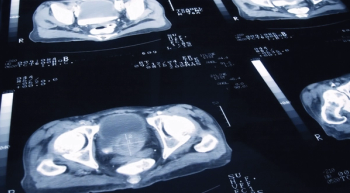
Encorafenib plus cetuximab, along with chemotherapy, was linked to antitumor activity and a manageable safety profile in patients with BRAF V600E-mutant metastatic colorectal cancer.

Encorafenib plus cetuximab, along with chemotherapy, was linked to antitumor activity and a manageable safety profile in patients with BRAF V600E-mutant metastatic colorectal cancer.

Ribociclib showed a significant reduction in risk of disease progression in patients with pre- and perimenopausal HR+, HR- advanced breast cancer.

Optimal treatment sequencing for patients with BRAF-mutated melanoma involves frontline immunotherapy following by BRAF/MEK inhibition, according to investigators.

At a median follow-up of 12.4 months, patients with IDH1-mutated acute myeloid leukemia had achieved a significant improvement in event-free survival with ivosidenib/azacitidine compared with placebo.

Darolutamide significantly prolonged metastasis-free survival compared with placebo in men with nonmetastatic castration-resistant prostate cancer with no added toxicity.

Patients with 4-1BB or LAG-3–expressing T cells at baseline, or a high proportion of PD-L1–expressing myeloid cells and plasmacytoid dendritic cells during boost cycles, may be more likely to benefit from the combination of nivolumab and ipilimumab.

Chronic graft-versus-host disease management has continued to advance in recent years, with new and anticipated treatment options for its treatment landscape.


Ruxolitinib, when administered using a pediatric dosing algorithm, was found to elicit responses in patients with chronic graft-versus-host disease with acceptable safety.

Oral azacitidine improved overall survival and relapse-free survival, while maintaining health-related quality of life in patients with acute myeloid leukemia.

Although the genomic profiles of African American men with prostate cancer differ from those of European American men, new data show that the frequency of actionable mutations for which targeted therapies exist occurs at a comparable rate in both populations.

In the adjuvant setting, circulating tumor DNA (ctDNA) may be a biomarker for the detection of post-surgical minimal residual disease (MRD) and for determining the clonality of relapsing disease.

While earlier efforts of precision medicine focused on basket trials, Tanios S. Bekaii-Saab, MD, explained that it’s time for the field of oncology to move on to umbrella trial designs that can better target an individual cancer.

Precision medicine is sweeping across the cancer care spectrum, and now, experts have their sights set on applying it in MCL.

Published: September 9th 2021 | Updated:

Published: January 28th 2023 | Updated:

Published: October 11th 2022 | Updated:

Published: December 18th 2022 | Updated:

Published: October 3rd 2022 | Updated:

Published: February 11th 2021 | Updated: